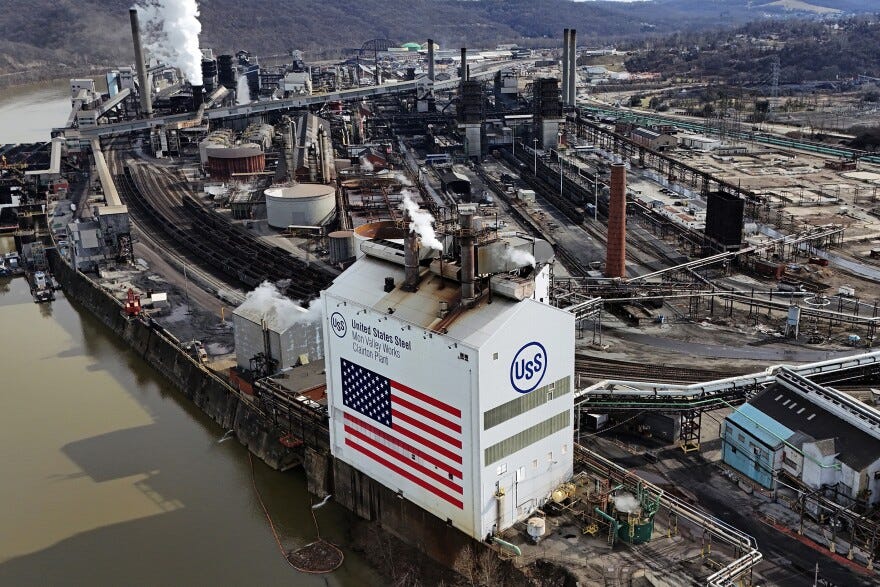I think you’ll have a hard time finding someone more pro-American manufacturing than me. It's precisely for this reason that I’m generally against tariffs as economic policy rather than for them.
Unless you’ve been living under a rock, you know that the Trump admin announced sweeping tariffs on essentially the whole world a few days ago. Of specific mention are the 34% (on top of the existing 20%) tariffs on goods manufactured in China, 20% on the EU, and 46% on Vietnam.
Instead of repeating arguments for and against that have been tirelessly aired on every form of media since the announcement, I hope to present a different take:
You can be pro-American [manufacturing] and be against tariffs. In fact this is the logical position to take, in my view.
Tariffs actually hurt Americans and American manufacturers in the long run, by:
Shielding American companies from much-needed competition which makes them better
Increases the input cost of manufactured goods, reducing manufacturer’s profits and/or increasing the prices that they charge customers
Reduce the quality of goods and services that Americans can purchase
Competition & Culture
I’ve written before about the decline of many previously successful American corporates, such as GM. GM is a great example here: China’s BYD is simply building better cars than GM on any objective measure. This morning, I was watching a review of the recently-announced U9 Supercar. It is more fully featured, faster, and meaningfully cheaper than the comparable Corvette. It has rear-wheel steering, active suspension, self-driving, is electric, and costs less than half of a Corvette.
The fact that we have de-facto banned BYD in the US causes a few problems for GM:
GM has no market incentive to improve the Corvette. Their domestic customers have no choice: if they want a supercar in this form factor, they basically only have the Corvette
GM’s engineers have no incentive to even learn about the tech that BYD brings to market. “Benchmarking”, an industry term for tearing down a competitor's car to learn about it, has no place because BYD isn’t even a competitor in the domestic market
Americans are deprived of the access to new technology that the U9 offers.
While a supercar of course isn’t a necessary good, you can see how this would extend to non-luxury, high tech items that improve the lives of most Americans, such as robotics, chips, etc.
China’s BYD has built a car that is simply better than its American counterpart, the Corvette. GM is shielded from this competition, and Americans are deprived of access to the new technology.
Americans should be rightfully embarrassed about tariffs - they are simply an admission that our companies, our ingenuity, and our industrial capacity can’t compete. Instead, in order for our companies to compete “fairly” in our domestic market, we need to shield them from the very competition that makes them better.
The big risk here is that American corporations further decline in productivity and culture. As I’ve written about at length, the decline of the work ethic, mission orientation, and creativity of American corporations should worry us all. Similar to how the government controls aspects of the economy that should be privatized, without the profit motive and competition, I’d expect the further decline of giants such as Boeing, GE, US Steel, and others.
Another Strategy
Ok, so if we don’t put tariffs in place, how will we encourage more investment into American manufacturing? I’d argue that there’s a ton that we haven’t done and can do, which are far more positively effective:
Meaningfully deregulate
At the federal level, remove whole swathes of regulatory bodies and functions throughout each department. Ask the question: does this department or function limit the ability for a company to make things in the US? If yes, delete it.
Encourage and coerce states to reduce permitting and related regulations for building housing, energy resources, and others. Eliminate the permitting purgatory as I laid out here.
Complete a DOGE effort across federal, state and local government: cutting spending, particularly in areas that crowd out private investment in manufacturing
Reduce barriers to entry for new companies
Encourage capital formation via reduced taxes on cap gains and carried interest
Allow anyone to invest in private companies, not just qualified purchasers
Open up defense and related procurement to more and smaller companies instead of the legacy primes. Compete on price and performance. Pivot most procurement to merit-based fixed price contracts as opposed to cost-plus.
Reduce labor costs
Make all states right-to-work, reducing the power of unions. Remove similar regulations that strengthen unions and protect them from company action
Let the free market decide wages. Remove artificial floors.
Spur investment in key production inputs: infrastructure, energy and raw materials
Allow drilling and development on federal land, sell lots of it for mining and issue permits along with the sale
Remove permits entirely for new interstate transmission lines, reduce bureaucracy substantially for new nuclear development, adopt ERCOT-style “connect and manage” interconnection processes throughout the grid
Remove the majority of environmental regulations surrounding mining
Cap NEPA reviews to 15 days. If no determination is made with 15 days, allow the project to proceed
Encourage infrastructure investment and reduce barriers for small companies to participate in building it out, like I’ve posted about here
Recruit the best from around the world
Grant automatic H1-B visas to all college graduates in STEM fields
Build the Office of Global Recruitment (OGR): tasked with recruiting top engineers from around the world. Offer “signing bonuses” based on specialty of skillset, part of which is paid to the individual and part of which is paid to the company they come to work for.
Meaningfully increase border security to shut the illegal immigration loophole while speeding up legal immigration processes by 50% via basic technology and operations infrastructure at USCIS.
By doing the things mentioned above, and not artificially protecting companies like US Steel from competition that harm them long term, American industry will thrive








I like most of these, but I'm not sure about this one
> Allow anyone to invest in private companies, not just qualified purchasers
I think there's mostly good reasons for investor protection laws. Instead of this, I'd focus on reducing unnecessary regulatory and disclosure requirements for companies to go public, so that more companies could go public earlier on (I think it's generally a problem that more companies just opt to stay private indefinitely).